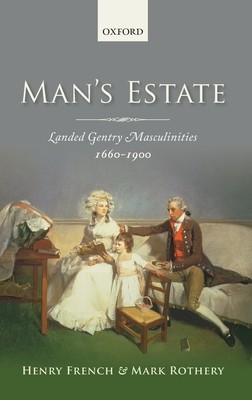
- We will send in 10–14 business days.
- Author: Henry French
- Publisher: Oxford University Press (UK)
- Year: 2012
- ISBN-10: 0199576696
- ISBN-13: 9780199576692
- Format: 15.5 x 23.6 x 2.3 cm, kieti viršeliai
- Language: English
- SAVE -10% with code: EXTRA
Reviews
Description
Masculinity is an expanding area of gender history. Man's Estate is the first book to focus on a particular social group, the English landed gentry, and to cover a time span of several hundred years. The authors move beyond the study of printed conduct literature, which dominated earlier accounts, by examining the values expressed in family correspondence in order to get closer to social practices. Letters between parents, children, siblings, and other relatives reveal the ways in which masculine norms were produced through everyday interactions and judgements, and help to reconstruct the subjective experiences of elite masculinity in this period. Man's Estate concentrates on four important periods in the life-course for the reproduction of these masculine values: schooling, university, foreign travel, and marriage and family life. These illustrate that there is only limited evidence of sharp-edged differences in values between generations in these families, and that these
changes appear not to correspond to the deep 'hegemonic shifts' so often emphasized in existing accounts.
EXTRA 10 % discount with code: EXTRA
The promotion ends in 23d.18:35:33
The discount code is valid when purchasing from 10 €. Discounts do not stack.
- Author: Henry French
- Publisher: Oxford University Press (UK)
- Year: 2012
- ISBN-10: 0199576696
- ISBN-13: 9780199576692
- Format: 15.5 x 23.6 x 2.3 cm, kieti viršeliai
- Language: English English
Masculinity is an expanding area of gender history. Man's Estate is the first book to focus on a particular social group, the English landed gentry, and to cover a time span of several hundred years. The authors move beyond the study of printed conduct literature, which dominated earlier accounts, by examining the values expressed in family correspondence in order to get closer to social practices. Letters between parents, children, siblings, and other relatives reveal the ways in which masculine norms were produced through everyday interactions and judgements, and help to reconstruct the subjective experiences of elite masculinity in this period. Man's Estate concentrates on four important periods in the life-course for the reproduction of these masculine values: schooling, university, foreign travel, and marriage and family life. These illustrate that there is only limited evidence of sharp-edged differences in values between generations in these families, and that these
changes appear not to correspond to the deep 'hegemonic shifts' so often emphasized in existing accounts.


Reviews